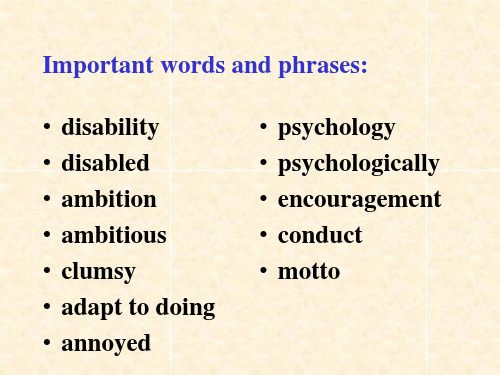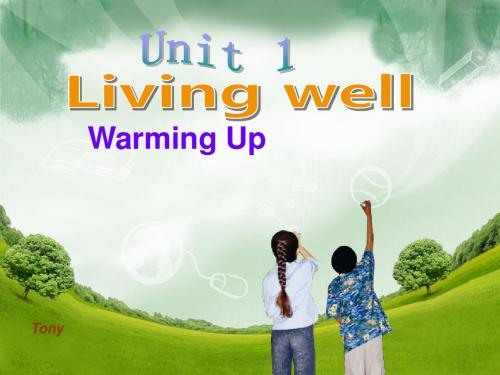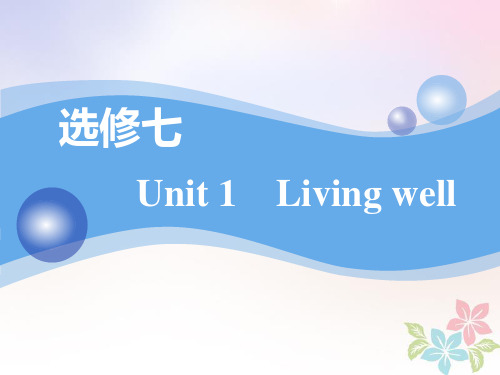- 1、下载文档前请自行甄别文档内容的完整性,平台不提供额外的编辑、内容补充、找答案等附加服务。
- 2、"仅部分预览"的文档,不可在线预览部分如存在完整性等问题,可反馈申请退款(可完整预览的文档不适用该条件!)。
- 3、如文档侵犯您的权益,请联系客服反馈,我们会尽快为您处理(人工客服工作时间:9:00-18:30)。
adapt:
Practice
1) You can’t see through the telescope until it is ________ to adjusted your eyes. fit 2) The shoes __ me well. match 3) A red jacket doesn’t _____ green trousers. suits 4) No dish ____ all tastes. adapt 5) You should _____ yourself to the
关于breath的短语: catch one’s breath 口气 hold one’s breath above one’s breath lose one’s breath 来 recover one’s breath waste one’s breath
歇口气, 缓 屏住呼吸 高声地 喘不过气 缓过气来 白费口舌
辨析: adapt, adjust, fit, suit, match
指修改或改变以适应新条件 adjust: 多指 “调整, 调节”使之适应 fit: 多指“大小适合”,引申为“吻 合” suit: 多指“合乎要求、口味、性格、 情况” match: 指“大小、色调、形状、性 质”等相配或相称
3. In other words, there are not many people like me. 换句话说, 像我这样的人并不多。 in other words 换句话说 in a word 总而言之 in word 口头上
in plain words 率真地说 have a word with sb. 和某人谈谈 have words with sb. 和某人吵架 get in a word 插话 keep one’s word 守信用; 履行诺 言
7. …, when I got out of breath after running a short way or had to stop ... out of breath 上气不接下气, 喘不过 e.g. Don’t make him carry such a heavy box, or he will be out of breath. 别让 他搬 那么重的箱子, 否则他会喘不过气 的。 When he climbed to the top of the mountain, he was nearly out of breath. 当他爬到山顶的时候, 几乎是上气不接下 气。
2. She is proud to have taken part
in competitions and to have broken a record by running two laps this year. 今年她参加了多次比赛, 而且打破了 两圈 (800米) 赛跑形式, 这种 形式表示不定式的动作发生在谓语动词之 前。e.g. She said she was sorry to have missed you. 她说她是很遗憾没有见到你。 翻译下列句子: 对不起, 让你等了这么久。 I’m sorry to have kept you waiting for such a long time.
小试牛刀 用used 的相关短语完成句子。
used to living alone. 1) The man has got _________
used to travel by train, but now by 2) I _______ car. 3) What disease can the new medicine be used to deal with? _________
know how to make me better, but I
am very outgoing and have
learned to adapt to my disability.
不幸的是, 大夫们不知道如何治好我
的病, 但是我很开朗乐观, 学会了适应
身体的残疾。
不定式和疑问词whether, what, which, whom, where, when, how, why等连用, 在句中起名词性作用, 常跟在tell, know, show, decide, learn, wonder,explain, advise, teach, discuss, find out等动词后作宾语, 有时也作主语、表语。 e.g. Do you know how to prove a new idea in scientific research? How to do it is a problem for me now.
He was disabled from walking by the
accident. 由于车祸, 他不能走路了。
He devoted his life to helping the disabled.
他付出一生的心血去帮助那些残疾人。
She swims well despite her disabilities.
考点1
【拓展】介词后一般不直接跟不定式, 但可 以跟疑问词+不定式短语作宾语。 e.g. Mary gave some advice on how to learn English. I have no idea of how to do it. 【随时练】 --Do you have the experience like that? --Well, I’ve done the work before, so I know what_____ in my new job here. A. expected B. expecting C. to expect D. to be expecting
5. My motto is: live one day at a time. 我的座右铭是: 活一天算一天。 at a time 一次, 依次, 每次 at one time (过去)有个时期, 一度, 曾经 e.g. The girl often eats one apple at a time now, but at one time she ate several apples in an hour. 现在这女孩经常 每次吃一个苹果, 但她曾经一个小时 吃了几个。
她虽然身有残疾, 却是个游泳好手。
Practice
用disable, disabled, disability的正确形式 填空。 1. People come to agree that the disabled _______ should also be treated with respect. 2. People with disabilities _________ should not be looked down upon. 3. The unexpected accident _______ disabled her from undertaking heavy work.
人教课标版 高二 选修7
Unit 1
1. disable disabled
v. 使......失去能力 adj. 伤残的
the disabled
disability
残疾人; 伤残者
n. 伤残;无能;无力
e.g. Old age disabled him for hard labour.
年迈使他不能干繁重的工作。
8. … do not make me annoyed, … annoy vt. 使不悦;惹怒;打扰 annoyed adj. (人)感到生气(恼怒)的 annoying adj. (事情)惹人生气的 annoyance n. 烦恼;烦扰 常用搭配: be annoyed with sb. 对……感到生气 be annoyed for /at/about sth. 对……感到恼火 to sb’s annoyance 让某人恼火的是
9. All in all I have a good life. 总而言之, 我生活得挺好。 all in all 有关的短语: 总而言之 其他与
in all 总共 after all 终究,毕竟 above all 首先;首要;最重要的 all alone 独自,独立地 all at once 突然,忽然,同时 at all 根本不, 一点也不
更多time短语:
at times in time 有时 at the same time 同时
at any time 随时all the time 一直
及时 on time 准时
in no time
立刻
ahead of time 提前
时不时
from time to time
6. I used to climb trees, swim and play football. 我过去常常爬树、游泳和踢足球。 used to表示“过去常常做……”, 暗含 现在已经这样做。 其否定式为used not to do sth. 或 didn’t use to do sth. used to do sth.的反意疑问句形式用 usedn’t 或didn’t。
e.g. My father used to read newspapers after breakfast. There used to be a meeting on Monday, didn’t/usedn’t there?
相关句型: be used to do sth. 被用来做某事 (是use sth. to do sth.的被动形式) be/get used to (doing) sth. 习惯于(做)某事 e.g. The wood is used to make paper. I’m getting used to the cold weather.





